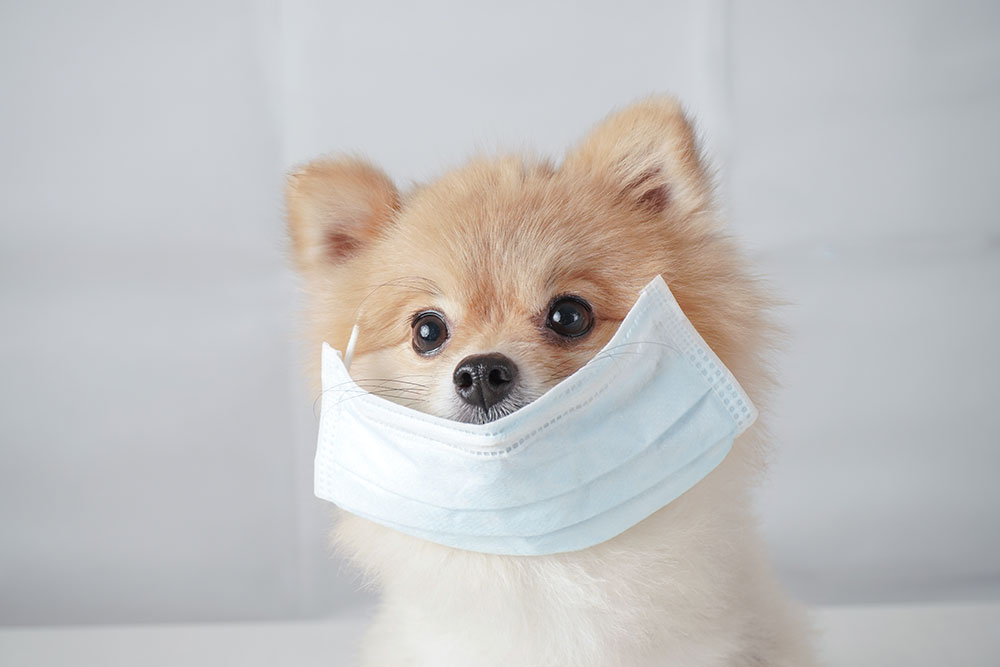We are in the midst of a pandemic caused by a novel strain of coronavirus. This virus started in animals but jumped to humans in late 2019. Now seen worldwide, it is responsible for killing thousands of people and infecting many more.
Coronaviruses belong to a large family of viruses that are seen in virtually every animal, including humans. They have mutated for tens of thousands of years to create new viruses, jump species, and infect new hosts. Some virus mutations result in new viruses that are very adept at infecting the new species. When this happens, a new virus is born. This is the story of COVID-19.
There are many different coronaviruses that affect both animals and people; most are transient with unapparent or mild clinical signs. For example, in dogs and cats, there are coronaviruses that cause intestinal disease. You may not know your pet has been infected, and if illness occurs, it is usually self-limiting. In dogs, another coronavirus is responsible for some cases of kennel cough.
Sometimes, though, coronaviruses can be more serious in pets. The feline intestinal coronavirus can mutate into a very aggressive and deadly disease called feline infectious peritonitis, or FIP.
In people, only seven coronaviruses are known to cause disease. Four of these are responsible for the common cold. These viruses have been around for a long time and cause symptoms such as sore throat, sniffles, and cough. In the past two decades, three new human coronaviruses have emerged – SARS in 2002, MERS in 2012, and COVID-19 in 2019.
As with other coronaviruses, the three new coronaviruses in people – SARS, MERS, and COVID-19 – all jumped from animals to people, underscoring the zoonotic nature of these viruses. Zoonoses are diseases that come from animals to people. The recent COVID-19 originated from bats. The four coronaviruses that cause the common cold are also believed to have originated from animals.
In the case of both SARS and MERS, the viral mutations were only partially adept at infecting people. This limited the spread of those viruses, and they eventually died out.
The mutation that created COVID-19, however, is a more perfect match for human infection.
Since we know that coronaviruses can jump species – from animals to humans – it begs the question whether the reverse can happen, too. As a pet owner in a novel coronavirus pandemic, do you need to be concerned about infecting your cat or dog with corona if you get sick?
The simple answer is: No. Despite the thousands and thousands of cases of COVID-19 in the world, pets are not becoming sick with this virus. Coronaviruses are species-specific, unless they mutate to infect another species, and then it’s a new virus.
But, you may ask, what about the dog that tested positive in Hong Kong two weeks ago? Its owner had been sick with COVID-19 and had been in close contact with the pooch. Multiple swabs taken from the dog were positive, although the animal never showed signs of disease. This is likely a case of a pet being transiently infected with a virus that prefers another host. As an accidental bystander, the dog eventually cleared the virus. Interestingly, this dog was 17 years old; there have not been any cases reported in younger dogs.
However, the more complicated answer regarding whether you need to be concerned about infecting your Fido and Fluffy is: Maybe. Remember that coronaviruses are zoonotic and have jumped species for thousands of years. This is a rare event, but it is still happening, which is why we are now in the midst of a pandemic with a new virus.
Everything we know about COVID-19 is that it will not make cats and dogs sick. However, we are still learning about COVID-19. The Centers for Disease Control and Prevention (CDC) and the World Health Organization (WHO) recommend precautions if you are home sick with suspected or confirmed COVID-19:
*Wash your hands frequently. Go to the CDC website and learn to do this properly.
*Wash your hands before and after touching your pet.
*Limit contact with your pets, as you would with other people in your household. Avoid snuggling or kissing your pets, and avoid sharing food with them.
While there is no evidence that pets can spread COVID-19, coronaviruses are adept at mutating so it is prudent to limit the virus’s opportunities to do this.
Be prepared for your pets’ care at home if you are unable to leave your house to get their supplies. Think about what your pets would need if you were told to stay home for fourteen days. Keep a two-week supply of pet food, cat litter, and necessary medicines for Fido and Fluffy.
If you are well, spending extra time with your pets can be good for you and help relieve stress.








Thanks for the article about the Corona Virus. It is so clearly explained.